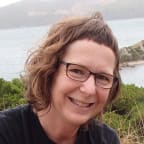
Vew of Lord Howe Island from the summit of Mount Gower, and a pair of white terns (images: A. Ballance)
New Zealanders are world-leaders when it comes to eradicating unwanted introduced pests from islands. Our knowledge and experience has been exported around the world, and now over 300 islands world-wide have had successful eradication projects. Until now these eradications have mostly been on uninhabited islands – that is, islands without a permanent community. Now, there is talk in New Zealand of aiming to eradicate various pests, usually mammalian predators, from larger inhabited islands such as Stewart Island or Great Barrier Island, and perhaps even mainland New Zealand in the future.
Lord Howe Island in Australia is already several steps ahead of New Zealand, and could become the first inhabited island in the world to make itself rodent-free.
This 1500 hectare island lies 700 kilometres north-east of Sydney but has strong biological ties with New Zealand, and geographically sits on the sunken continent of Zealandia. With a permanent community of 350 people, it makes its money from eco-tourism, and it has been discussing an eradication plan for ship rats and mice since the early 2000s.
It has already eradicated feral goats and pigs, and got rid of both feral and domestic cats. In 2012 the Federal Government of Australia and the Government of New South Wales jointly came up with A$9-million for a one-off aerial rodent eradication programme.
Alison Ballance visited Lord Howe Island recently to find out if it could offer any lessons for New Zealand about eradications on inhabited islands. What she found was a divided community – while everyone she spoke to agreed that a rodent eradication is a great idea in principle, many are concerned about the aerial nature of the eradication, the use of the anti-coagulant brodifacoum in a wide-scale once-off operation and what they perceive as a lack of communication from the Lord Howe Island Board.
While none of the opponents of the plan wanted to speak on record, Alison talked with other islanders who explained the island’s history of introduced species, the extinctions that have resulted and their opinions as to why the proposed eradication is a good idea. Barney Nichols is deputy chair of the Lord Howe Island Board; Bill Shead owns Arajilla Retreat; naturalist Dean Hiscox owns Lord Howe Island Environmental Tours; naturalist Ian Hutton is Director of the Lord Howe Island Museum; and New Zealander Peter McClelland is the Lord Howe Island Rodent Eradication Project Manager.
And the key lesson for New Zealand? That the first step in any proposed eradication is to get the community fully engaged and behind the idea.


